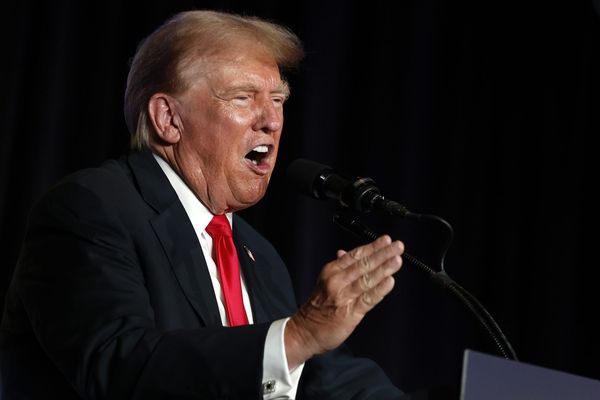
Billy Hughes and Hugh Mahon both came into Parliament with Federation, and both would leave in notable ways.
Hughes exited “in a coffin” as the oldest and longest-serving MP in the history of Australia’s Parliament. Mahon, thanks to Hughes, would be the only MP ever to be expelled from it. This expulsion led to what was, until the weekend in Aston, the only byelection in which the government gained a seat from the opposition.
The Melbourne Punch described Mahon as “one of the most interesting personalities in the national legislature. There has been more stirring incident [sic] in his career than in a dozen ordinary men’s lives”.
He was born in 1857 in King’s County, Ireland, and became a journalist and activist in his early adulthood. He was jailed in 1881 for his work with the Irish National Land League. Released with suspected tuberculosis but soon threatened with rearrest after he fled to London, he sailed for Australia in March 1882. Liberal MP Russell Broadbent would later describe Mahon’s arrival as that of “virtually a refugee”.
He continued his activism and journalism for the next 17 years, eventually ending up in Western Australia’s sprawling goldfields, founding the Menzies Miner, and then editing The Sun in Kalgoorlie, where he built a reputation as a fearless crusading journalist, relentlessly attacking WA’s Forrest government and successfully defending five libel cases.
“Mahon could put more venom into a stick of type than any man I ever knew,” wrote a contemporary, who called Mahon’s headlines “masterpieces of alliteration and venom”.
In Australia’s first federal election, he was elected to the seat of Coolgardie for Labor. Over the next 19 years, he would be in and out of Parliament and work in four ministries. Dr Jeff Kildea, who wrote a two-volume biography of Mahon — and provided valuable help on this piece — notes that Mahon was a deeply contradictory man. He was ahead of his time in his views on Indigenous peoples (indeed, he called for an amendment of the constitution to give the federal Parliament power to legislate for Indigenous peoples, 66 years ahead of his time). But even by the standards of the day, Kildea notes, he was unusually racist towards the Chinese and Afghan populations in Australia.
Mahon certainly had his admirers, but several sources refer to a coldness and a tendency to bitter sarcasm. Kildea writes that when “annoyed by what he perceived as the wilful blindness of others, he tended to resort to invective, a propensity that often proved more likely to alienate rather than to persuade, to make enemies rather than allies when it was the latter he needed in order to advance.”
The Westralian Worker — edited by future PM John Curtin — said his “snobbish coldness of demeanour would make a snake shudder”.
The aftermath of World War I and the fissures it caused in Labor would prove decisive for Mahon’s future. First, it split him from Hughes, who was expelled from the ALP for his pro-conscription stance. He took 23 MPs with him and won government with his new National Labor Party in 1916. Then came the Irish War of Independence in 1919. In October 1920, Irish nationalist Terence MacSwiney died in prison in Cork, Ireland. He had been on hunger strike for 74 days while imprisoned by the British for sedition. At an open-air meeting in Melbourne on November 7, The Argus reported that Mahon declared:
Never in Russia under the worst rule of the tsars had there been such an infamous murder as that of the late Alderman MacSwiney. They were told in the papers that Alderman MacSwiney’s poor widow sobbed over his coffin. If there was a just God in heaven that sob would reach round the world, and one day would shake the foundations of this bloody and accursed empire.
Though Mahon claimed his comments were misleadingly reported, it was that last phrase (which he never denied uttering) that seems to have really done for him. On November 11, Hughes moved to expel him for making “seditious and disloyal utterances at a public meeting”, and for being “guilty of conduct unfitting him to remain a member of this house and inconsistent with the oath of allegiance which he has taken as a member of this house”. During his speech, Hughes returned to the “bloody and accursed empire” phrase 14 times.
As Frank Bongiorno writes in his recent Australian political history, Schemers and Dreamers:
[Mahon] had pointedly refused to attend what he correctly regarded as a Hughes stitch-up. In an intemperate speech even by his standards, the prime minister accused the Labor member of having ‘bitterly humiliated and insulted the people of this country’, and branding ‘with epithets foul and slimy our fellow citizens in Britain’. Yet, for all his ruthlessness and bluster, Hughes was too wily to allow a charge of sedition to be tested in court.
After a lengthy debate, the motion passed as dawn broke on November 12 and Mahon thus became the only MP to be expelled from the house in this way. While the episode is now widely regarded as an injustice and an act of political opportunism from Hughes, it was not seen that way so soon after a war in which 60,000 Australians had given their lives for that “bloody and accursed empire”.
Kildea writes that “in the charged political and sectarian atmosphere of 1920 many Australians … [believed] that the Parliament had done the right thing by ridding itself of a seditious and disloyal member”. Mahon failed to win back his seat at the December 1920 Kalgoorlie byelection, and never returned to Parliament.
In 1929, Mahon sought to have his expulsion motion rescinded, but there was little appetite from his former party to revisit the matter, and in 1931 Mahon died in Melbourne. In 1984, a joint select committee of Parliament criticised his expulsion as an “abuse of power by a partisan vote” and in 1987 legislation was passed removing Parliament’s power to expel its members.
In 2016, Labor’s Graham Perrett put forward a private member’s motion, that the house recognise that Mahon’s expulsion was “unjust” and a “misuse of power then invested by the house”. It lapsed.







